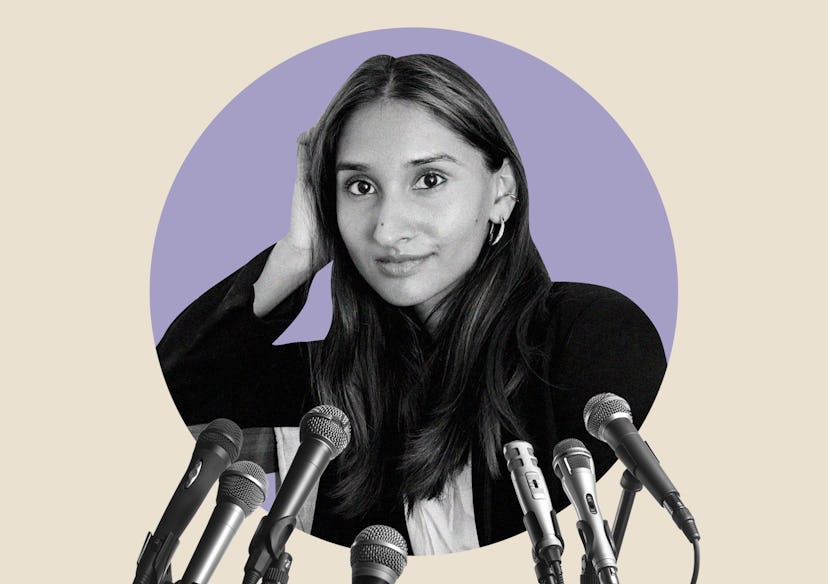Quick Question
Meet The Fashion App Founder Revolutionising The Way We Shop
Eshita Kabra-Davies on why sharing fashion is the way forward.

In Bustle's Quick Question, we ask women leaders all about advice. Here, founder of fashion rental app By Rotation, Eshita Kabra-Davies tells Bustle how to spot greenwashing, her role models in life, and why she’s no longer shopping on the high street.
It’s no secret that the fashion industry is one of the most environmentally wasteful industries out there. As per Business Insider's reports, our need for new garments emits more carbon than international flights. But, our shopping habits are starting to shift. With the By Rotation app – the Airbnb of clothes if you will – founder Eshita Kabra-Davies wants to change the way we consume fashion altogether.
Getting started is easy, and a number of celebrity endorsements are testament to it's popularity – fans include Stacey Dooley, Katherine Ryan, Mollie King and many more. The success is largely down to Kabra-Davies' revolutionary vision. She has a background in investment management, and has been web designing since the age of 11, so was well equipped to drive the eco-conscious fashion message forward when creating the app.
The idea came to her on a trip to her motherland Rajasthan, India, where she saw first-hand the impact of the textile industry. This was juxtaposed with the countless social media images she saw of people sharing outfits of the day #ootd, which they'd rarely wear twice. "What if we could just share or borrow from the woman on the square?” she asked herself, envisioning a more conscious circular economy. By Rotation allows you to do exactly that, to enjoy fashion and mix things up as much your heart desires, without actually buying new clothes.
“I do believe half the problem of the industry is down to consumption,” Kabra-Davies tells us. “So, I wanted to create a product that was really for regular people like you and me.”
Here, Kabra-Davies shares the best career advice she's ever received, why diversity in sustainable fashion matters, and her tips for being a more conscious consumer.
When did you become aware of the need for more sustainability in fashion?
EK: It was this eye-opening honeymoon I had in my motherland, which was last year in late February. I was a regular consumer, consuming in a linear fashion – buy, use, wear maybe 10 times, and then end up donating. And often, now I've learned a lot of these donations to charity actually ended up going to landfill.
I didn't really realise how wasteful the fashion industry is until the honeymoon. Although, I was already looking at fashion rental when I was trying to plan my outfits for the holiday. I was researching the global landscape, and I didn't really see any player in the UK that was very established. So, I started thinking, 'what if we could just share what we already own'.
You worked in the financial world for years prior, how did that inform your understanding of the fashion industry?
EK: I didn't really realise how much waste goes in and out of the industry until I started immersing myself in the sustainable fashion movement. The key takeaway that I had was that as a regular customer, I could do something about it. It wasn't only up to the brands and the production houses to make a change.
Thanks to my background in investment management, I've got the commercial experience in creating a new business, and obviously doing the finances.
How can regular consumers stop ourselves falling for brands that might be greenwashing?
EK: It depends on how much you're willing to dig. Having worked in finance, I would probably look at how much revenue is being generated by a brand's 'sustainable' or 'conscious' collection. If it's less than 20%, then I'm not sure that they're actually very serious.
The sustainable movement can appear somewhat whitewashed, how do we encourage more people of colour to feel involved?
EK: We need to give them a platform, so that they can also share their opinions. I feel like the sustainability movement, fashion in particular, like much of the fashion industry can be very whitewashed.
What's the best career advice you've received since creating By Rotation?
EK: Well, this is something that I was told earlier in my life – money saved is money earned. I think it's a saying that's super helpful, especially during COVID-19. For me, resilience is the word of 2020.
Who are your role models?
EK: Definitely my dad. He is a successful entrepreneur across quite a few industries, and he's very tough love. I also like how authentic Sharmadean Reid, founder and of Beautystack is. Being an entrepreneur is very glamorised – you have to be young, you have to be under 30, and god knows what else. Successful entrepreneurs like Sharmadean Reid are quite transparent and honest about how it's not always very glittery. I appreciate that.
What practical tips and tricks have you picked up along the way to make your day-to-day more sustainable?
EK: I don't shop high street at all anymore, especially when it comes to fashion. It's just a no-no, which can be a bit hard, but it's great because it makes me always go back to rotating with other people.
What are your hopes for the future of By Rotation?
EK: We want to transform how people are consuming fashion by making them buy better and buy less, and share more. We want to go global, and we want to have local communities everywhere where people can just rotate with each other.
This article was originally published on